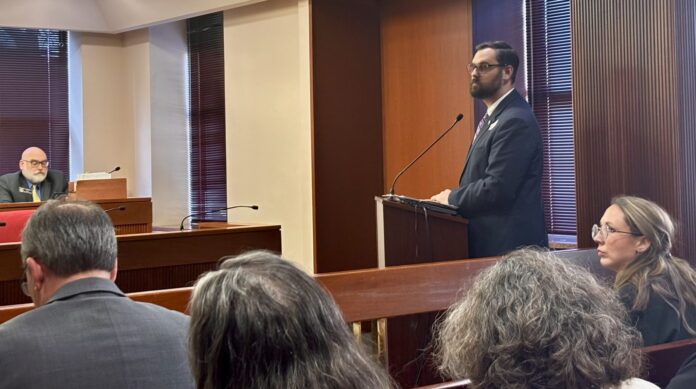
(Georgia Recorder) — A Georgia House elections panel advanced a bill Tuesday that would prevent the Secretary of State from participating in a multistate database that state election officials and voting rights advocates say helps maintain accurate voter rolls.
Republican members of a House elections subcommittee voted Tuesday in favor of passing the so-called Voter Integrity Act. House Bill 215 would prohibit state election officials from remaining in the Electronic Registration Information Center, or ERIC, and sharing voter registration data with non-governmental entities.
The bill was amended Tuesday to allow the Georgia secretary of state to enter into other intra-state compacts for voter list data.
Georgia Secretary of State’s office officials and various voting rights advocacy groups defended the ERIC system as a way to maintain accurate voter rolls and cautioned that leaving the system would be costly and inefficient for the state. Georgia now spends about $97,000 annually as one of 24 members of the election registration database.
ERIC is a multi-state voter list database that has been used by state election officials to identify 72% of people during voter list maintenance since 2021. Using various sources such as property tax records and motor vehicle department reports, the voter lists database attempts to identify people on voting rolls who have moved out of state, died or may be ineligible for other reasons.
The bill now advances to the full House Governmental Affairs Committee after advancing by a party-line vote Tuesday.
Rep. Martin Momtahan, a Dallas Republican, sponsored the bill and said Georgia should follow several other states in moving away from the ERIC system in favor of more state-based solutions.
“Some of this has to do with voter data and confidentiality,” Momtahan said. “Obviously, sending that information to a third party is not always foolproof or safe from a cybersecurity standpoint.”
In recent years, President Donald Trump and a number of Republican officials across the country have targeted the Electronic Registration Information Center as they’ve questioned election security. They’ve complained about the potential cybersecurity threats, including the sharing of personal information.
Critics also focus on ERIC’s expansion of voting access because states are notified when individuals have not registered to vote after moving to a new district.
State Elections Director Blake Evans said obtaining data from one state takes 20 times as long as getting data from the entire ERIC membership.
Evans said the ERIC database is the only multi-state entity capable of detecting duplicate voter registrations across state lines. Last year, the state received an exemption from the provision that requires Georgia to mail notices to unregistered eligible voters, he said.
Marisa Pyle, senior democracy defense manager with All Voting is Local, said HB 215 would have unintended consequences by making it harder to maintain accurate voter rolls.
Pyle spoke about the difficulties faced by states that have left the ERIC system, including increased costs and inefficiencies.
Garland Favorito, co-founder of Voter GA, said that a pressing concern about ERIC is that it violates public trust by sharing personal identifying information without their consent. Favorito repeatedly cast doubt on former President Joe Biden’s 2020 Georgia win over President Donald Trump.
According to Favorito, there are other options for maintaining voter lists, such as Eagle AI and state-to-state exchanges that share information such as public tax records without requiring personally identifiable information to be shared with third parties.
“We can use out-of-state voter registrations that can be matched to detect permanent moves and public tax records, all without third-party access, all without giving our data away,” Favorito said.
State Rep. Saira Draper, an Atlanta Democrat, said state law does not prevent Georgia from joining other voting list compacts with other states. Draper, who is an elections attorney, said the Republicans supporting the bill are focused on a “solution in search of a problem.”
Draper said Eagle AI lacks the level of security protocols implemented by ERIC, which has not been hacked.
When sharing certain voter information with other member states, ERIC adheres to rigorous security protocols such as encryption, she said.
“You can get into an agreement with Alabama but if there is a breach in Alabama then it’s out of your hands,” Draper said after Tuesday’s meeting.
Draper said she believes security concerns aren’t the prime motivation behind Republicans in Georgia wanting to change the current system.
“I think part of the motivation was to remove that requirement that we registered unregistered voters, because they didn’t realize that we already are exempt from that provision of ERIC,” she said. “I think the other motivation is to try and push the legitimacy of Eagle AI, which is far from a legitimate data source.”
The nonpartisan Brennan Center for Justice describes Eagle AI as a project developed by election deniers that could undermine voting rights.







